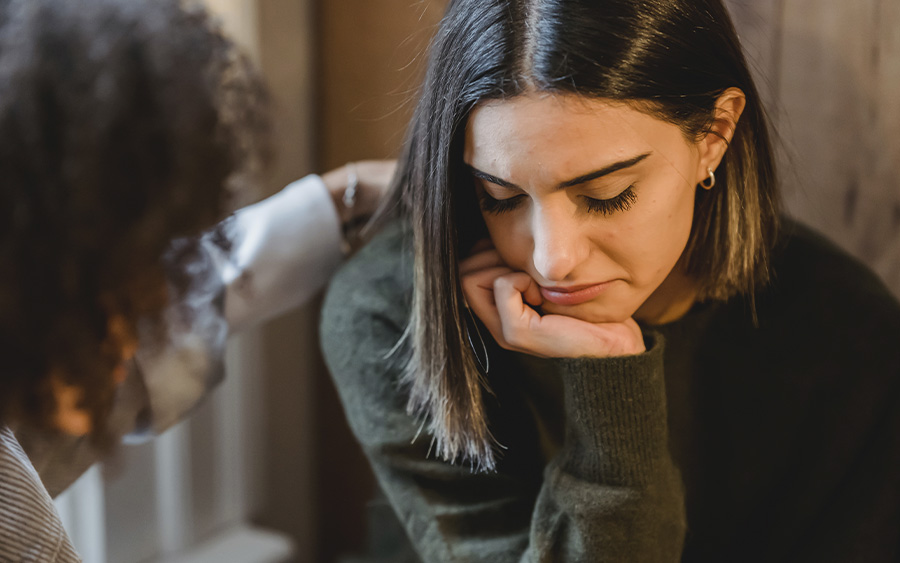Wondering what causes anxiety? Understanding the root causes of anxiety is the first step toward managing it effectively. Discover 5 tips to help you navigate through anxious moments.
We all experience anxiety. About work, going on a date, moving to a new place, or taking a test. It’s quite common to feel worried, nervous, or uneasy when dealing with difficult challenges in our lives. So, it can be helpful to understand what causes anxiety and how we can better cope with it.
This might surprise you, but there’s actually a purpose for anxiety. It is meant to protect us from danger by preparing us to react faster to a threat. This is known as our fight-or-flight response. So, in the “right” amount, anxiety can help us perform better and boost our creativity.
However, persistent anxiety can have a damaging and debilitating impact on our lives and our mental and physical health. High levels of anxiety can get in the way of doing things you enjoy or even wanting to spend time with your family and friends.
So, to manage your anxiety and maybe even take advantage of the positive effect it can have, it’s important to understand what can be causing it in the first place.
What Causes Anxiety?
According to the National Institute of Mental Health (NIMH), the exact causes of anxiety are unknown. However, it is likely a combination of genetic and environmental factors, including:
- Genetics: there may be a genetic predisposition toward anxiety. While having a family member that struggles with anxiety doesn’t necessarily mean you will too, it may increase the likelihood of it.
- Background: our personal and family history, culture, and education can influence our perspectives on how to best cope with anxiety. As well as, how willing we are to look for help.
- Life events: What happens in our relationships, work, school, and other contexts in which we move can have a powerful impact on the level of anxiety we experience and the way we deal with it.
- Sex: Research suggests that females are more likely to develop anxiety disorders than males. Although this may depend to some extent on the disorder.
- Overall Mental Health: Anxiety can go hand in hand with other mental health conditions, such as depression, trauma, or an eating disorder. It’s important to check and seek help for all these conditions.
These factors, along with brain chemistry, determine the gravity of our anxiety, how it impacts our lives, and how we handle it. So, what can you do to reduce your anxiety and put in place healthier coping skills?
5 Tips to Help You Cope with Anxiety
1. Learn to identify and manage your triggers
When anxiety takes over, try taking your time to figure out what is bothering you or making you feel uneasy. Exploring your thoughts and feelings regularly can help you better understand and cope with your anxiety.
Have you tried writing it down? Sometimes writing can help you get in touch with the causes of your anxiety. Another way to get some clarity, and a fresh perspective on your anxious feelings, could be by talking with a trusted friend or family member.
2. Breathe your way into the present moment
One of the challenges of dealing with anxiety is that it sets you up in a loop of worry and takes you away from the present moment. So, one way to stop the loop is to take your focus off the worry and bring it back to the present.
The next time your anxiety starts to take you away, try to pause for a moment and take a few deep breaths. A simple breathing exercise can help you relax your body and mind and restore your sense of balance. Don’t know any breathing exercises that work? A professional can help you find what works best for you.
3. Focus on what you can change
Do you find yourself worrying about things that haven’t happened and may not happen at all? Many of us are no strangers to anticipatory anxiety. Even though everything seems to be okay, we still worry about potential problems down the road, such as breaking up, losing our jobs, or getting sick.
As much as you wish, you can control most of the things in your life. However, you can decide how you deal with them. For example, instead of fearing losing your job, you can use that energy to motivate yourself to improve your skills or maybe even find a new job that better fits your goals.
Step by step, you can learn to cope with your anxiety and use it to your advantage. By taking action and being proactive, you can gain a bit more control over what happens.
4. Take care of your mind and body
What you eat, how much you sleep, and whether or not you exercise, can all impact the way you experience anxiety. Research shows that a healthy diet, regular physical activity, and good sleep habits can prevent anxiety and have a powerful effect on your mental well-being.
By eating balanced meals – stock up on fruit and veggies! -, exercising regularly, and getting a good night’s sleep, you strengthen your health and nip your anxiety symptoms in the bud.
5. Don’t be afraid to ask for help
As many of us struggle with anxiety, it can be helpful to share your experience to learn how others cope with it, and also help them with your examples. People close to you can help you recognize when your anxiety is taking over and come up with an action plan to overcome it.
Sometimes, talking about it with someone you feel comfortable with can help you feel better. Especially if you feel you can be honest and open about what’s causing your anxiety.
If you feel overwhelmed and need additional support, a therapist can help you explore these issues further and guide you through coping skills that work for you.
Anxiety Therapy in Baltimore, MD
Are you suffering from anxiety? Do you feel it keeps you from doing the things you want to do? If anxiety is a constant damaging presence in your life you should consider seeking professional help.
At New Connections Counseling Center, our therapists will provide a safe space for you to slow down and tune into the underlying fears that are causing your anxiety. They will help you discover different coping tools to help you feel more balanced and connected with the path you want to pursue.






